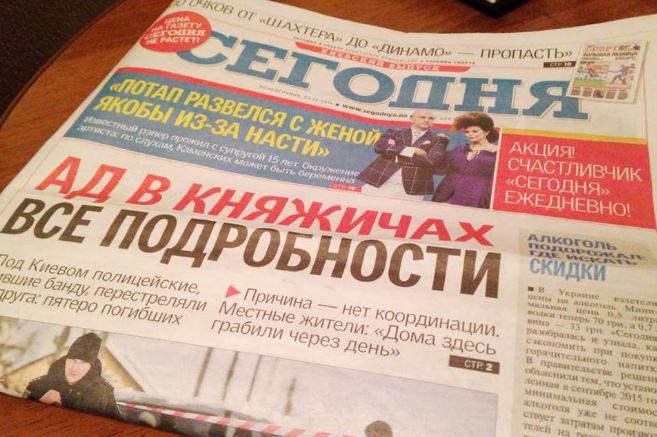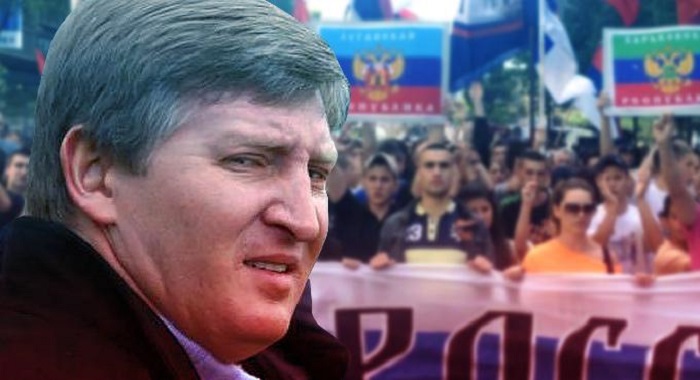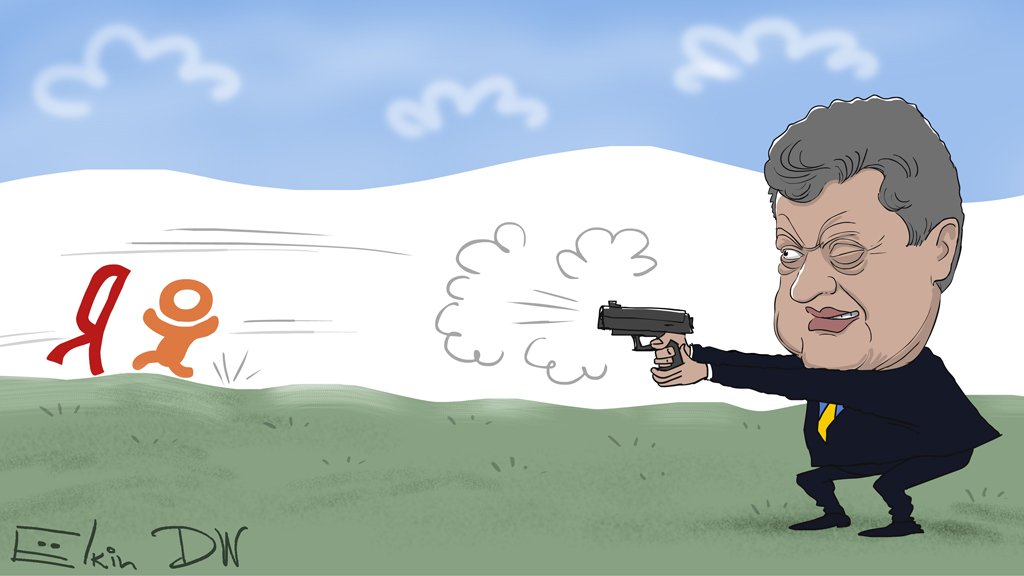During the last 3 years, Ukraine has made big progress in media freedom, despite the war. The Reporters Without Borders estimated that this year the country improved its position in the 2016 World Press Freedom Index and moved up 22 positions (from 129 in 2015 to 107).
An annual survey by Internews showed that over 2015-2016, Ukrainians have grown more aware of who owns the media - the awareness of local media ownership jumped up by 15% to 35%, and of national media ownership - by 5%, to 50%. Importantly, around 40% of respondents think that transparency around media ownership is important. Ukrainians are trusting Russian media less, Ukrainian media more, and internet news are digging into TV viewership.
Oligarchs still set the rules for the mediasphere. However, the situation is much better than in Russia - the variety of oligarchs in Ukraine make the environment in the media field more competitive and gives space for different opinions. Unlike Russia, where very few media attempt to get rid of state control, which sometimes seems like almost an impossible task.
Recently Ukraine also made a huge step towards media transparency by adopting legislation on revealing media ownership. A project to monitor media ownership in Ukraine was promptly launched by the Institute of Mass Information and Reporters Without Borders. There were few surprises when the owners of Ukraine’s main TV channels were revealed, with two exceptions - the ownership structures of Ukraine’s two largest channels Inter and 1+1 were more complicated than expected.
Media is considered an unprofitable business in Ukraine, or at least so say the TV channels’ managers:
“Despite the existing opinion that TV channels are a business, they are actually unprofitable and exist on subsidies. Running one is an act of love to art or to the motherland,” says the owner of the News One channel, Opposition Bloc MP Yevhen Muraiev.
Yevhen Liashchenko, director of the Ukrayina Media Group, confirms: after the crisis of 2008, Ukrainian TV stopped being a profitable business - the advertising market collapsed, Ukraine’s ban on Russian TV series meant more losses for the channel owners who planned their content for a year ahead. And it is the owners who need to cover the losses.
So if these people don’t earn money, what do they receive instead? Let’s take a closer look at the owners of the major Ukrainian channels.
The importance of TV ownership

According to the USAID U-Media 2016 media consumption survey, TV channels are still the main source of information for Ukrainians. 82% of the respondents answered “TV” for the question “Which media have you used during the last 30 days as a source of news?”. Compared to the last year, the popularity of TV dropped by 3%. Still, 82% is a telling number.
It means that neither Facebook, nor Internet sites, but TV plays the main role in forming the opinion of the majority of Ukrainians to certain events.
According to the survey, the most popular news channels were:
- 1+1. The final beneficiary of the channel is the oligarch Ihor Kolomoyskyi. His main interests are in banking and oil production. In 2014-2015, he was a governor of Dnipropetrovsk Oblast.
- Inter. According to the structure of the channel's ownership, it has three final beneficiaries – Dmytro Firtash, Serhiy Liovochkin, and Valeriy Horoshkovskyi. According to the Focus magazine, oligarch Firtash is #8 in the rating of the richest Ukrainians. His interests are chemical industry, energy, real estate, agribusiness, and media. In 2014 he was arrested in Viena on charges of corruption and creating a criminal community. In March 2014, he was released on bail for EUR 125 mn. In November 2016 Spain declared him wanted internationally.
Liovochkin used to be the head of the administration of disgraced President Viktor Yanukovych, now he is an Opposition Bloc MP and one of the most influential dark cardinals in Ukrainian policy.
Horoshkovskyi among other positions used to be the head of the Security Services (SBU). According to the head of the group Informational Resistance Dmytro Tymchuk, the SBU almost cut down the measures on resisting Russian security services under Horoshkovskyi's leadership. - STB, part of Starlight Media holding, belongs to the Ukrainian billionaire Viktor Pinchuk, who is an influential figure in Ukrainian policy and is married to a daughter of the second Ukrainian president Leonid Kuchma.
- ICTV is also a part of the Starlight Media holding.
- Ukrayina TRC is owned by the Ukrainian Oligarch #1 Rinat Akhmetov, a monopolist of the coal market in Ukraine.

The First Deputy Head of the National TV and Broadcasting Council Olha Herasymiuk says that the new law is imperfect because it’s impossible to verify the final information about the owners and benefactors, if the property was registered on some offshore island:
“[The OSCE mission] asked us how the map of the [ownership of] broadcasters changed. We can only answer that the owners have changed, maybe some property was sold and the owners’ names were rewritten, but this does not give us the opportunity to explore the broadcasting map.”
Meanwhile, the owners of the TV channels are happy to use their media power for their own interests.
Examples of overuse of the power of TV channels

The most recent example of overuse of TV power was observed during the Euromaidan revolution. Euromaidan activists were outraged by how the central channels – Inter, TRK Ukrayina and the First National Channel – manipulated the information in accordance with the policy of then President Viktor Yanukovych. In the middle of the protests, on 5 January 2014, the Ukrainian national union Maidan called to boycott the Inter channel because of the following reasons:“Our news not pro-regime anymore, they are outright propagandistic,” complained Inter journalists in an open letter
“In the last weeks, the editorial policy of this channel changed dramatically. With no objective reasons, the topic of Maidan [protests] disappeared from the news and even if it is shown it is manipulated to the extent of having nothing in common with reality. Considering the personnel changes which preceded these trends, we conclude that it is the planned and deliberate policy of the Presidential Administration which uses the Inter channel in the worst propaganda purposes, trying to make an impression that everything is calm in the country and there are no million of Ukrainian citizens protesting against the authorities.”
Inter’s coverage of Euromaidan had far more in common with Russian media than with reality on the ground - either it ignored the protests altogether, like attempting to give away Euromaidan protesters on New Year as ordinary celebrators, or ignored the position of the protestors, showing only the government’s position. “Our news not pro-regime anymore, they are outright propagandistic,” complained Inter journalists in an open letter on 21 February 2014, just one day before roughly a hundred protesters were shot. Previously, a part of the channel’s shares belonged to the Russian First Channel (Perviy Kanal). It remained so even after the Euromaidan revolution until in 2015 this share was sold to the Ukrainian oligarchs.
The abuse of TV power in private interests continues in post-Euromaidan Ukraine. For example, in 2014 the country was a spectator of oligarchic wars between Inter and 1+1. The former released a so-called investigation about 1+1 owner Kolomoiskyi. The oligarch was depicted as a chameleon and the worse evil for the country. After the material was released, 1+1 hastened to come up with an answer: the channel’s audience saw investigative programs about Firtash and Liovochkin, owners of Inter. In particular, the journalists of 1+1 accused the oligarchs in complicity to the regime of disgraced Yanukovych.
Even though there might have been some reasonable arguments in materials of both of the channels, its creators were not thinking about the country's good:
“How $825 mn turned against $1.8 bn and what came out of it – this is how we can approximately describe the largest public conflict between politics and business in Ukraine's history [...]. The first figure is the total value of the assets of its two participants - businessman Dmytro Firtash and Serhiy Lyovochkin, the former head of the Presidential Administration of Yanukovych’s time. The second is the similar index of their opponent, the [that time] governor of Dnipropetrovsk region and co-owner of Privat Group Ihor Kolomoiskyi,” is how journalist Maksim Butchenko described the conflict in 2014.
The channel of Kolomoyskiy was involved in another scandal a year later when its owner came under pressure from another competitor-oligarch and President of the country Petro Poroshenko. In 2015, 1+1 it reached an agreement with the most famous political program in Ukraine Shuster Live. The cooperation was broken at the very beginning when the program hosted by the charismatic Savik Shuster was stopped. This happened after Radical Party leader Oleh Liashko criticized Poroshenko on air, but the real reason for the cessation of the show was never revealed. One of the assumptions was that after being pressured by Poroshenko Kolomoiskyi did not want to exacerbate the situation. Afterward, Ukraine’s top channels rejected Shuster.
The TV host declared that the freedom of speech in the country came under attack. However, it is fair to say that Shuster has an ambiguous reputation too. On the one hand, he gave airtime to politicians from all sides of the political spectrum. On the other hand, many times he was accused under multiple pretexts – from not paying taxes and receiving money in his offshore account to receiving bribes by politicians in exchange for airtime. In this regard, Yuliya Tymoshenko seemed to be the most dubious guest of the program. In the best times of Shuster Live, she received enormous amounts of airtime during the prime time in pre-election period.
But how many people will do this? And how many are just deceived by populists’ slogans and get involved in oligarchic scandals without knowing it? Which share of TV channel Ukrayina’s audience watching materials about the charity fund of its owner Rinat Akhmetov realizes Akmetov’s real role in the conflict in eastern Ukraine?
What about printed media, radio, and the Internet?

Even taken together, printed media and radio can't compete with TV popularity. According to the USAID survey, 28% respondents used radio and 23% used printed press in the 30 days before questioning. Both of these types of media in Ukraine are put in the hands of oligarchs too.
According to the USAID research, the leaders among Ukrainian newspapers are Segodnya and Argumenty i Fakty (Ukrainian edition). The former is financed by Rinat Akhmetov and the latter belongs to the United Media Holding (UMH) of Serhiy Kurchenko, one of the major media holdings in Ukraine. The image of the Ukrainian media landscape will not be full without Kurchenko and UMH.
The story of the media holding is dramatic. It was founded by Boris Lozhkin (now the head of President Poroshenko’s Administration) in 1994. By 2013, it owned the major radio stations and popular magazines in the country, including Forbes Ukraine. In the first half of 2013, Lozhkin sold the holding to Serhiy Kurchenko.
Kurchenko is a phenomenon among Ukrainian oligarchs. He joined the top-10 of the richest Ukrainians before turning 30. Before the Euromaidan revolution, he was strongly associated with Yanukovych. It was thought that Kurchenko was a fake oligarch the Yanukovych family needed for covering their shadow business.
The first few months passed without changes, until right before the Euromaidan revolution. Roughly 20 journalists and editors of highly popular Korrespondent, including the chief editors, left because of constant pressure. During the Euromaidan revolution, the pro-government slant in the editorial policy of the outlet became obvious. The media of UMH lost a share of their audience in that period.
A similar story happened to the Ukrainian edition of the famous world outlet Forbes Ukraine, which also belongs to the UMH. A few days before the beginning of the revolution a group of journalists headed by the chief editor left the publication because of interventions in the editorial policy.
In March 2014, it became known the US publishing house planned to revoke Forbes Ukraine’s license. However, later the editorial staff was informed that Serhiy Kurchenko still owns the license.
Two years later, the US arbitration court residually prohibited the Ukrainian desk to use the Forbes brand and confirmed the legitimacy of the decision to revoke the license. The UMH was forbidden to use the Forbes trademark, including Forbes Ukraine or any other use of it in printed media, online or in applications.
In their decision, the arbitration court referred to UMH’s violation of the editorial policy, as provided by the license agreement.
However, you can still find Forbes for sale and online in Ukraine. As according to the statement of the current editorial staff of the Ukrainian Forbes, they have a right to work until the decision will be recognized on the territory of Ukraine.
Media ownership is not the only problem in Ukrainian Internet. There are many questions to its technical providers. The company Ukrtelekom is a monopolist on the telecommunication market of Ukraine. Its owner is the abovementioned oligarch #1 Rinat Akhmetov. It means that in certain circumstances a provider can even block a site as it has happened before.
Ihor Rozkladai, the media reform expert of the civic initiative Reanimation Package of Reforms, is confident that in the future the power of the Internet can change the status-quo in Ukrainian media. In his opinion, the audience should get used to paying for content. Another step towards the deoligarchization of the media, says the expert, is transparency of media ownership. As it’s one thing to reveal the owners and another - to find out where the money came from. According to the expert, media outlets are usually financed by cash or from offshore companies at present.
So the situation in Ukrainian media is not hopeless, but by far is not perfect. However, often when the international community accuses Ukraine of violation of freedom of speech, it looks in the wrong direction. It so happens that those who speak about the violations against media the most are actually the ones who control it and set its policy.





